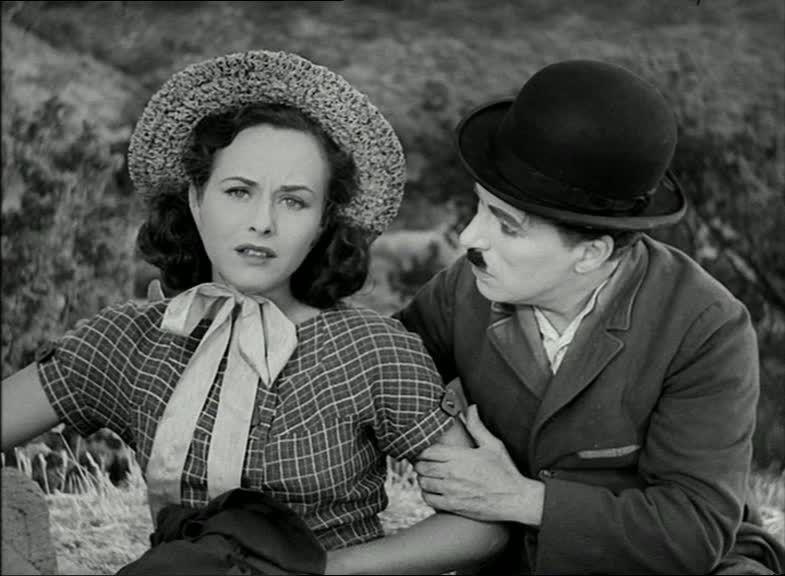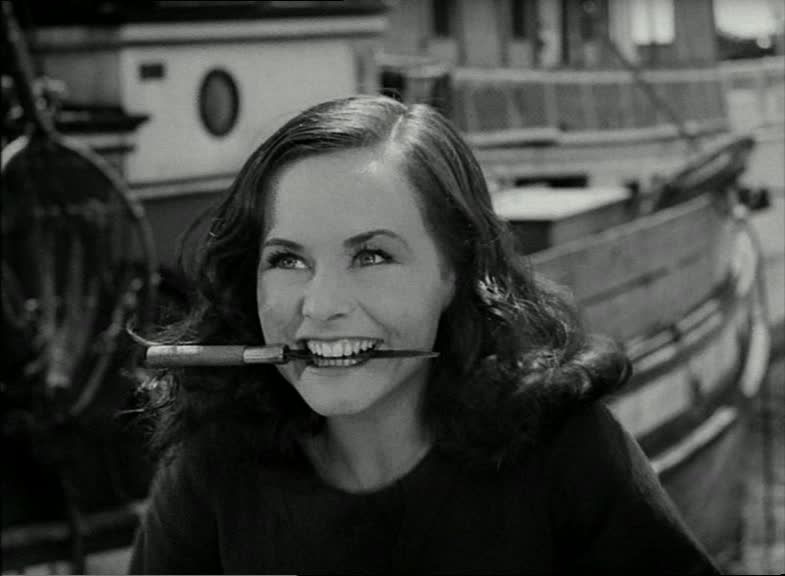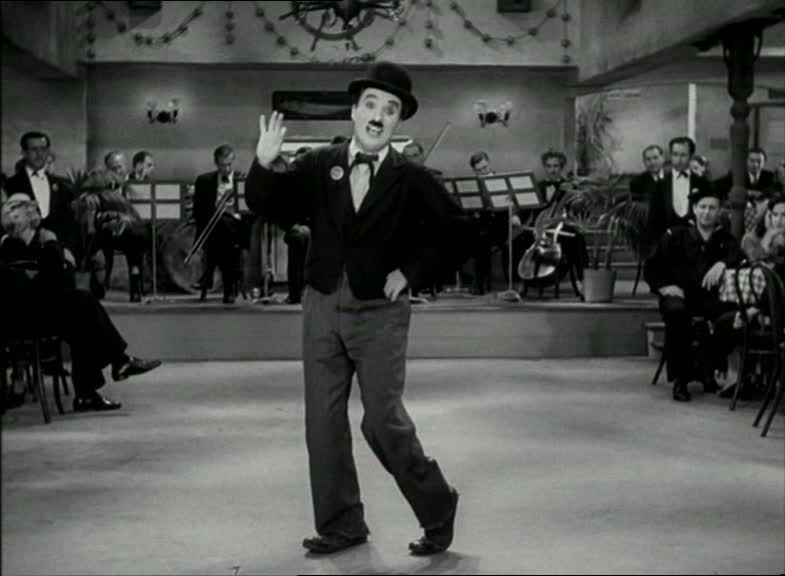
Modern Times was the last of Charles Chaplin's "silent" movies, made after the silent era was over for everyone else, with pretty much only Chaplin hanging on — and Chaplin only able to hang on because of his special clout and fame. Like its predecessor City Lights, this isn't a true silent film, since it has a synchronized musical score (written by Chaplin himself) with sound effects and even, in this case, some actual speech. This is Chaplin's affectionate goodbye to the silent era, one last great masterpiece of silent aesthetics, with only a few small concessions to the sound pictures that had taken over the rest of Hollywood. Virtually all of the actual intelligible dialogue in the film is delivered through machines: the boss' voice barking orders over the intercom, a radio news report, a robot voice that delivers a sales pitch even as the salesmen stand silently nearby, miming along with the recorded voice. This suggests Chaplin's suspicion about the coming of sound in the movies, treating the voice as disconnected from the speaker, always with a mechanical layer between the source and the sound.
That suspicion of the modern and the mechanical runs through the film, which is a brilliant satire of modernity, with a jaundiced eye cast on the unemployment and misery of the Depression, as well as the supposed improvements of modern factories and technology. Chaplin plays a factory worker on an assembly line, unable to pause in his repetitive tasks for a moment without falling behind. This is a society that seeks to mechanize and automate everything, including even eating, thus eliminating one of the only breaks the workers get and turning it into just another step in the assembly line process. It's no wonder that this poor worker suffers a mental breakdown, unable to tolerate these oppressive conditions any longer. Chaplin, wrenches in hand, sees nuts everywhere, including in the buttons on the back of a secretary's skirt or across the breast of an older woman's suit; he's so compulsively locked into the rhythms of the assembly line that even his sexual responses are mechanical, a woman's body reduced to a series of machine parts to tighten and manipulate.
Now out of work, Chaplin's happier in jail, where he at least gets a comfortable place to sleep and some food — laced, in one outrageous scene, with cocaine from a drug dealer — than on the streets, where he's simply a poor bum. Once he gets out of jail, he's joined by Paulette Goddard's "gamin," a young orphan girl who remains a sprightly free spirit despite her life of poverty and deprivation. She is positively feral and ferocious from the moment she first appears on the screen, baring her teeth in a wild grin, a knife clamped between her jaws like a pirate as she steals bundles of bananas for the other poor kids of the waterfront. She's a magnetic and vivacious presence, with an electric smile that lights up the screen, and she's every bit Chaplin's equal, perhaps the only one of his leading ladies about whom that could be said.


Together, Chaplin and Goddard embody the determined spirit of the Depression's poor, locked out of jobs, unable to provide for themselves, living on the streets and scratching together whatever scant food and shelter they can get. And yet they never give up, and their spirit is infectious, their enthusiasm and boundless optimism propelling the film forward into one inspired comic set piece after another, the humor always tinged with the harsh truths of poverty and struggle. Chaplin is continually bouncing in and out of jail and getting fired from one job after another despite his well-intentioned but bumbling attempts to get by. He stumbles into countless comic situations, at one point accidentally leading a Communist rally by picking up a red flag from a passing truck. The rally's quickly broken up by cops, as is a later strike by factory workers — in fact, there's very little that the cops don't break up, and the film is rather contemptuous of these authority figures who can only endlessly arrest and chase those who are just trying to ease their hunger in any way they can.
Towards the end of the film, Chaplin returns to tweaking the new talking pictures, with a sequence in which Goddard gets Chaplin a job as a singing waiter. Chaplin seems to be preparing for his entry into the sound era, teasing the audience with the prospect, at long last, of his voice being heard on film. He rehearses a number, having Goddard write out song lyrics on his cuffs, but he rehearses silently, mouthing the words and dancing, and when he finally does sing, he's forgotten the words, so he just makes up a nonsense song that's mostly pseudo-Italian dialect, gibberish and an occasional recognizable English phrase. It's a wonderful way of ushering Chaplin into the sound era without having him actually communicate anything intelligible, and the film as a whole provides one last visually, viscerally eloquent expression of Chaplin's privileging of image over sound.
The film's conclusion is justly famous, with a stunning final shot of Chaplin and Goddard walking off down a long road into the future, arm-in-arm, Chaplin duck-walking besides his beautiful partner. It's optimistic and exhilarating and utterly gorgeous, a perfect ending to a film that is often cynical about the mechanization of the modern age but is celebratory of the human ability to resist this dehumanization, to fight back with song and dance and silliness and determination and, perhaps most importantly, love. After all, this is undoubtedly a love story, one of the rare Chaplin films where the tramp doesn't give up his great love at the end; when he strolls away into the distance this time, for once he's not doing so by himself. Chaplin was in an off-screen relationship with Goddard at the time he was shooting this, and it's easy to see that romance in her onscreen radiance and the absolute adoration that's implicit every time Chaplin turns a camera on her. He's in love, and seems determined to communicate that love in every image of his costar; the result is that it's nearly impossible to watch the film without falling in love with her along with Chaplin. Romantic, hilarious, beautiful, and endlessly inventive, Modern Times is one of Chaplin's greatest works, an ode to the irrepressible human spirit and its capacity for love and invention.

11 comments:
One critic opined that MODERN TIMES was the equivalent of "Disney meeting Fritz Lang." Chaplin himself credited Rene Clair for some ideas from one of the French master’s best films. In any case, a fair number of fans consider this to be Chaplin’s most brilliant film, and it’s hard to dispute that estimation, even if I personally rank it as a close second behind CITY LIGHTS in the pantheon. The conveyor belt sequence, the food-tasting machine gig, the high society party where Chaplin spews gibberish, and the achingly poignant scenes with Paulette Godard as the waif are ingrained in the mind as is the spirit of the song “Smile” presented here for the first time in instrumental form. (but no less lyrical and tremendously moving) The film shows Chaplin at the peak of his powers, and in theme and presentation it’s the most auspicious and sophisticated statement he’s ever made. Again, Chaplin refused to conform with the talking medium (though some gibberish, sound effects and music are in place) and again his decision resulted in a huge commercial and artistic success. The song 'Smile' is one of the most justly celebrated of the twentieth century and another example of Chaplin's incomparable versatility as an artist. The lyrical, irresistible'Smile' was Michael Jackson's favorite song.
Another stupendous review in your ongoing Chaplin series that has now covered the definitive masterpieces.
"in theme and presentation it’s the most auspicious and sophisticated statement he’s ever made."
Well said, and I totally agree. That's precisely why I'd rank this as his best, although he made so many brilliant movies that it's always a close race. There are just so many wonderful comic sequences here, and Goddard is here as Chaplin's best, funniest, most charming leading lady, and the film is extremely thematically rich. Though the Clair and Lang comparisons are good - Metropolis is the most obvious reference point - really there's nothing else quite like this.
I also rank Modern Times as my favorite Chaplin, the emotional balance with the comedy and the social satire is perfect.
Excellent review Ed once again. It makes me revisit this masterpiece once again!
I give City Lights the edge, but what you describe here is right on the money, Ed. Chaplin expressed the zeitgeist of the Depression in the silest, most straightforward and honest way -- getting laughs all the while. And Paulette Goddard is radiant.
His sound films are a separate matter. Chaplin genuinely had "something to say" and he does it straight off with The Great Dictator and continues in his dark masterpiece Monsieur Verdoux -- which ends with "Charlie" going to the gallows.
Michael, yes it's a perfectly balanced movie, funny and moving and satirically sharp all at once.
David, I haven't watched many of the sound films yet, but I do love The Great Dictator, which is definitely, as in this film, Chaplin with "something to say." His satire is always blunt but really effective.
Ed, it is my opinion that Modern Times is Chaplin's greatest film. I think the satire angle, the tounge-in-cheek aspects make it feel more relevant perhaps. It's also a bit less reliant on pathos like in City Lights. Don't get me wrong, City Lights is a masterpiece. But Modern Times has something extra to me.
I'm with you there, Jon, and for me it's also a slight preference for the less overt pathos of Modern Times. It's just a perfect movie.
Your essay ends on just the right note, I think. All Chaplin's silents are overtures of love to a hostile world. As David E. says, that changed abruptly with sound and 'The Great Dictator' and 'Monsieur Verdoux', with their famous (and famously criticized) concluding harangues. Personally, I'll take 'The Gold Rush' as my favorite Chaplin film and its Oceana Roll as my favorite Chaplin 'bit'.
Ed, how do you do it? You are one prolific film writer.
Thanks, Mark. This is right on: "All Chaplin's silents are overtures of love to a hostile world." The Gold Rush is another pretty much perfect movie, and is probably Chaplin's most purely funny movie, the one that leaves me gasping for breath from laughing so much.
Modern Times is a masterpiece undoubtedly! Chaplin's tramp character and social commentary in Modern times is simply amazing and it is one of the finest films ever made. Most of his films are brilliant, and for me he is one of cinema's geniuses.
This is a great blog you have here, which I have now began to follow.Keep it up!
My blog: www.filmmasterjournal.com
Thanks, FilmMaster. No controversy about calling Chaplin a genius.
Post a Comment